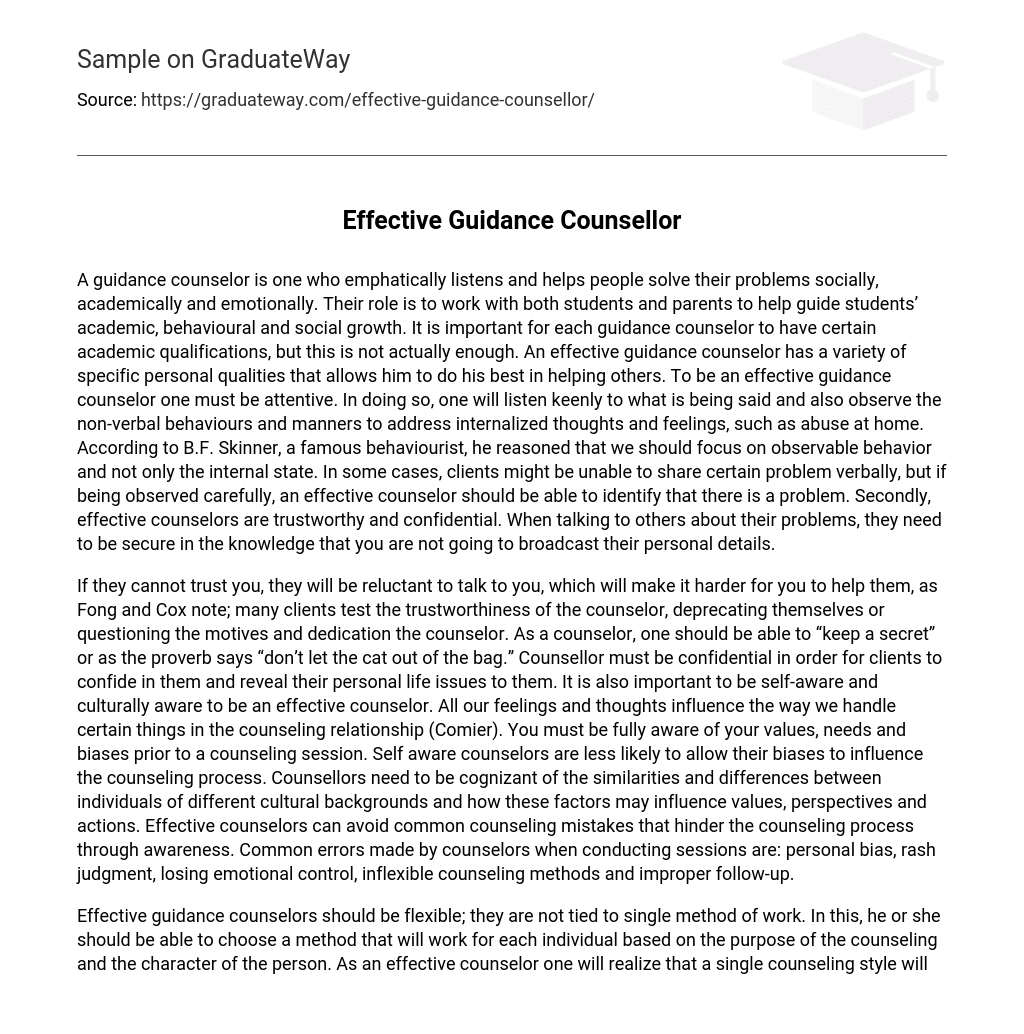A guidance counselor is someone who actively listens and assists others in resolving their social, academic, and emotional issues. Their role involves working with students and parents to support the students’ academic, behavioral, and social development. While having certain academic qualifications is important for a guidance counselor, it’s not enough. An effective guidance counselor possesses personal qualities that enable them to provide the best assistance to others. To be effective, a guidance counselor must be attentive – carefully listening to what is being communicated and also noticing non-verbal behaviors indicating internalized thoughts or emotions like experiencing abuse at home. According to behaviorist B.F. Skinner, it’s vital to focus on observable behavior rather than just internal states. Therefore, even if clients cannot express their specific problem verbally, an effective counselor should still be able to detect signs suggesting a problem through careful observation. Additionally, trustworthy counselors maintain confidentiality as individuals seeking help need reassurance that their personal information won’t be disclosed during discussions.
If clients cannot trust a counselor, they will hesitate to communicate, making it more challenging for the counselor to assist them, as noted by Fong and Cox. Clients often question the counselor’s trustworthiness, belittle themselves, or doubt the counselor’s motives and commitment. A counselor should possess the ability to keep information confidential, similar to the saying “don’t let the cat out of the bag.” Maintaining confidentiality allows clients to confide in counselors and discuss their personal life issues. Additionally, counselors should possess self-awareness and cultural awareness to be effective. Our emotions and thoughts significantly impact how we handle various aspects of the counseling relationship, as stated by Comier. Prior to a counseling session, counselors need to be fully aware of their values, needs, and biases. Being self-aware reduces the likelihood of allowing biases to influence the counseling process. Counselors must consider the similarities and differences among individuals from diverse cultural backgrounds and how these factors affect their values, perspectives, and actions. Awareness helps counselors avoid typical mistakes that impede the counseling process. Common errors during counseling sessions include personal bias, making hasty judgments, losing emotional control, using inflexible counseling methods, and improper follow-up.
Effective guidance counselors must possess flexibility and avoid being confined to a single approach. They should have the ability to select an appropriate method for each individual, taking into account the purpose of counseling and the individual’s character. Recognizing that a one-size-fits-all counseling style is not universally effective, I faced a similar situation with a Grade Three class I currently assist. Some students in the class were causing disruptions, so I initially assigned them writing lines, which they were accustomed to. However, this strategy didn’t work for me, so I had to devise alternative approaches to manage the class effectively. Counseling requires comprehensive knowledge across various domains, involving data gathering for informed decision-making regarding student plans and progress. An effective counselor should possess intellectual competency, as one of their responsibilities involves assisting students in making future-oriented choices. Therefore, guidance counselors need to possess a strong knowledge base to adequately support their clients.
Effective counselors must possess empathy and the ability to understand and support their clients. By demonstrating understanding and a willingness to assist, counselors can establish trust with their students and develop practical solutions for their issues. Furthermore, counselors should have the energy and stamina necessary to handle the emotional demands of their role. Offering support to clients helps in fostering respect, which enhances the chances of behavior change and goal attainment.
An example that illustrates this is when I encountered a young boy named Sanjay at the school who would aimlessly wander throughout the day. Recognizing his challenges, I took him to the resource room where I am employed.
Through numerous conversations, I obtained a deeper understanding of his thoughts and the importance he attributed to having someone who would lend an ear. This fostered a strong bond between us, prompting him to share intimate information with me. This highlights the essential role that guidance counselors fulfill in individuals’ lives – not just academically, but also on an emotional and social level. It is clear that certain qualities are indispensable for being an effective guidance counselor: reliability, discretion, and compassion. Aspiring guidance counselors must hence possess the necessary expertise and abilities to thrive in their role.
References
Articles from Britannica encyclopedias for elementary and high school students. Guidance and Counseling, Indore Madhukar.
http://www.thecounsellorsguide.co.uk/
Ponton, L. (2012). Characteristics of Effective Counseling. Psych Central.





